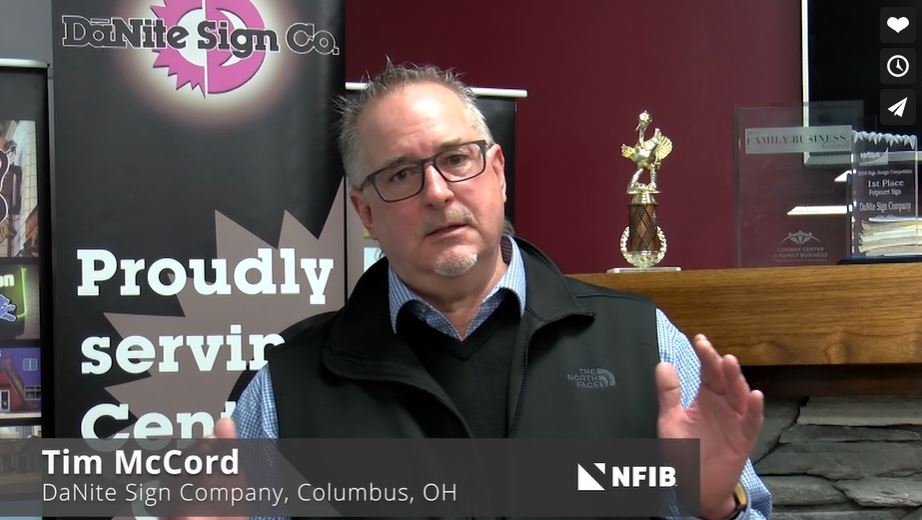Ohio is the third-most regulated state in the United States, behind New York and California. What does that actually look like? The Ohio Administrative Code (OAC) contains 274,470 restrictions and 15.2 million words. This would take you 21 weeks to read in its entirety. Small businesses are responsible for nearly two-thirds of job growth in this country. However, small business growth is often limited by the cost of regulatory compliance.
In the NFIB Research Foundation’s Problems & Priorities, which is a survey publication that poses a list of 75 business issues our members may encounter in their day-to-day operations and asks them to rank from most to least problematic, NFIB members in Ohio ranked “unreasonable government regulations” as the sixth biggest problem to their success. Additionally, our members ranked “uncertainty over government actions” and “state/local paperwork” as numbers nine and twelve on the list. I would like to note this is an improvement over our last survey but these issues are still impacting our members’ operations and clearly more can be done in this policy area.
With the passage of Senate Bill 9, Ohio is placed on the path to achieving a regulatory climate that protects public safety and welfare while ensuring our member small businesses are not overburdened. The bill was signed by Ohio Governor Mike DeWine. NFIB is grateful to the hundreds of members who participated in our call to action to reach out personally to their state legislators to get this important bill across the finish line.
Click the image to view the video.
“NFIB members have consistently ranked unreasonable government regulations as a significant impediment to success. For small business owners, the cost of compliance is twenty percent greater than larger companies. According to a study, Ohio has the 4th most regulations of the more than 40 states evaluated,” said Roger Geiger, Executive Director for NFIB in Ohio.
“Senate Bill 9 extends the prohibition, included in the last operating budget, on adding new regulatory restrictions without removing two, through June 30, 2025, and further requires state agencies to reduce regulatory restrictions 30 percent by that same date. NFIB and our members recognize the need to have in place rules and regulations providing for the health, safety, and welfare of all Ohioans. Everyone wants clean air and water as well as safe workplaces and appropriate consumer protections, but there is a balance necessary to ensure our small businesses are not faced with undue regulatory burdens. Senate Bill 9 will foster a positive evaluation of Ohio’s regulatory environment and hopefully reduce obstacles to our members’ operations,” Geiger continued.
“Finally, on behalf of Ohio’s small business community, NFIB expresses our sincere appreciation to both Senate President Matt Huffman and Speaker of the House Bob Cupp for their leadership, and to the primary bill sponsors Senators Kristina Roegner and Rob McColley. We also thank Ohio Governor Mike DeWine for his signature on this important piece of legislation to Ohio’s small business community,” said Geiger.
Senate Bill 9 builds upon previous efforts to establish a regulatory environment that is responsive to those being regulated: our members. The Common Sense Initiative Office (CSI) was created under the previous administration to raise awareness by state agencies of the potential economic impacts of their proposed rules. They continue to review rules, solicit feedback from impacted constituencies, and work to relieve/amend what could have been otherwise costly rules. We remain very supportive of CSI and the important work they do.
The 133rd General Assembly took several steps during the last operating budget, House Bill 166, requiring all state agencies to review their existing rules and create a baseline inventory of all rules that have regulatory restrictions. This list will be shared with the Joint Committee on Agency Rule Review (JCARR) as well as published on their agency website. Included in this inventory will be several crucial components including the statute under which the rule was adopted, and whether removing the restriction would require a statutory change. Also included in the last operating budget was a prohibition on agencies adding any new regulatory restrictions unless they remove two.
Senate Bill 9 expands on these foundations. The bill extends the prohibition on adding new regulatory restrictions without removing two, through June 30, 2025, and further requires state agencies to reduce regulatory restrictions 30 percent by that same date. Any agency not achieving this benchmark will be required to jettison two regulatory restrictions for each new one added after this date.
Under Senate Bill 9, state agencies will have clear criteria on how to evaluate whether an existing rule up for review would be removed under the reduction provisions of the bill. We feel this process will create an even more robust evaluation of rules by changing the way regulators view the need for ongoing or additional regulatory restrictions, raising further awareness of the potential impact on the regulated communities. Of import, some rules are not included in the reduction count such as any rule required to be adopted verbatim by a state or federal law, an emergency rule, and any rule not subjected to JCARR review. It is also critical to note, Senate Bill 9 provides a mechanism to allow state agencies to appear before JCARR and explain why the regulatory restrictive rules reduction threshold cannot be met.
Senate Bill 9 also empowers CSI to direct an agency to remove any rule that contains a regulatory restriction that is part of its inventory. State agencies can appeal such a directive to JCARR. If JCARR also determines a regulatory restriction should be removed, the agency must do so. In this role, JCARR will provide an additional, bipartisan legislative review of regulatory restrictions to ensure ongoing need and appropriateness.
Additionally, Senate Bill 9 directs JCARR to create the “Cut Red Tape System” which will include a website. This online resource will allow our members to request information about regulatory restrictions and to communicate directly with JCARR about those restrictions and their impacts.

